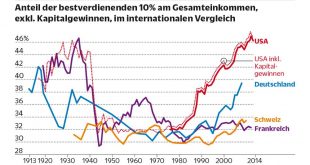In the AEJ: Economic Policy, Christopher Hoy and Franziska Mager report that people are less supportive of redistribution when they learn that they are poorer than they thought. We test a key assumption underlying seminal theories about preferences for redistribution, which is that relatively poor people should be the most in favor of redistribution. … people who are told they are relatively poorer than they thought are less concerned about inequality and are not more supportive of...
Read More »Wealth Inequality and Wealth Taxes
In a series of blog posts, John Cochrane criticizes the Saez-Zucman proposal for higher wealth taxes. In posts #1 to #4 he argues that economic arguments for wealth taxes are inconsistent or not convincing. In post #5 he concludes that Saez-Zucman truly are motivated by political objectives which are grounded in the view that wealth of the rich is ill-gotten or that the rich have a disproportionate, negative influence on politics. Saez and Zucman want to confiscate billionaires’ wealth,...
Read More »Justice and the German Public Debate
On German TV, stand-up comedian Dieter Nuhr exposes the contradictions of calls for justice and equality that characterize much of the German public debate. His hour-long performance could well serve as a lecture in economics and ethics.
Read More »Justice and the German Public Debate
On German TV, stand-up comedian Dieter Nuhr exposes the contradictions of calls for justice and equality that characterize much of the German public debate. His hour-long performance could well serve as a lecture in economics and ethics.
Read More »Inequality in the United States
… meanwhile, inequality in the US remains more of an issue. On Alphaville, Kadhim Shubber summarizes a DB Global Markets Research study on US inequality: More than 30% of US households have zero or negative non-home wealth. Wealth is increasingly concentrated among the old, and among the wealthy. Observers paint the picture of an increasingly dysfunctional society. And they point to the relevance of inequality for political polarization and accountability.
Read More »Inequality in Switzerland
In a paper, Reto Föllmi and Isabel Martínez document trends in income and wealth inequality in Switzerland over the last 100 years. Daniel Hug reports in the NZZaS (figures below taken from NZZaS). Data (World Wealth and Income Database, based on tax records). Some findings: Income inequality has been rather stable and is modest … … although social mobility as reflected in educational attainment is low. Income inequality at the very top has increased. The top 1% of income recipients earn...
Read More »Tax Evasion and Tax Rates
High rates of tax evasion are not necessarily a consequence of high tax rates. In an NBER working paper, Annette Alstadsæter, Niels Johannesen, and Gabriel Zucman provide estimates of countries’ wealth holdings in “tax havens.” Based on BIS statistics the authors find that: Wealth on the order of 10% of global GDP is held offshore. In Scandinavia, the number is much smaller. In continental Europe, it equals roughly 15%. In some Gulf and Latin American countries, almost 60%. In Russia, the...
Read More »US Top Income Shares Rose Less Dramatically
That’s what Gerald Auten and David Splinter argue in a paper from last year. … new estimates of top income shares using two consistent measures of income. Our measure of consistent market income includes full corporate profits and adjusts for changes from TRA86, including changes to the tax base and increased filing by dependent filers. In addition, we include employer paid payroll taxes and health insurance and adjust for falling marriage rates. The effect of these adjustments on...
Read More »Tax Evasion and Wealth Inequality
The Economist reports about a study by Annette Alstadsæter, Niels Johannesen and Gabriel Zucman who matched leaked information from Swiss banks and Panamanian shell companies with Scandinavian wealth records. Their findings: Tax evasion is progressive. The average / top 1% / top 0.01% Scandinavian household paid 3% / 10% / 30% fewer taxes than it should. Accordingly, estimates of wealth inequality (based on tax data) likely underestimate the degree of inequality.
Read More »Who Voted for Brexit?
In a CEPR Discussion Paper, Sascha Becker, Thiemo Fetzer, and Dennis Novy argue that education and income mainly explain voting outcomes. In the abstract of their paper, the authors write: We find that exposure to the EU in terms of immigration and trade provides relatively little explanatory power for the referendum vote. Instead, … fundamental characteristics of the voting population were key drivers of the Vote Leave share, in particular their education profiles, their historical...
Read More » Swiss Economicblogs.org
Swiss Economicblogs.org

